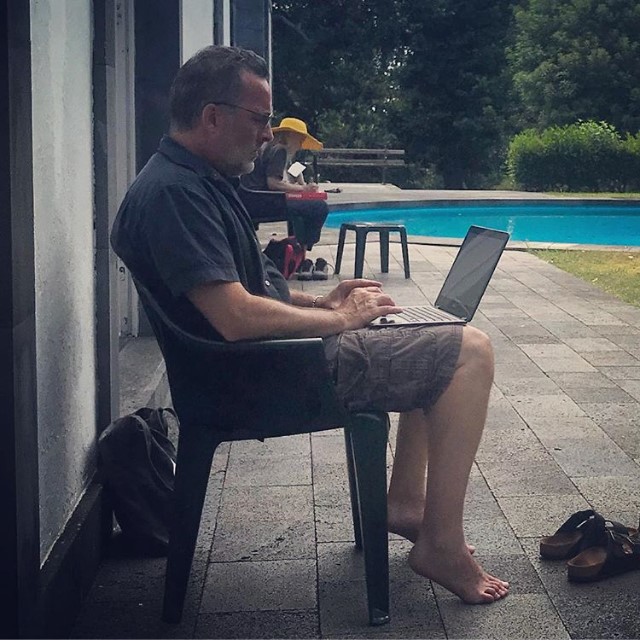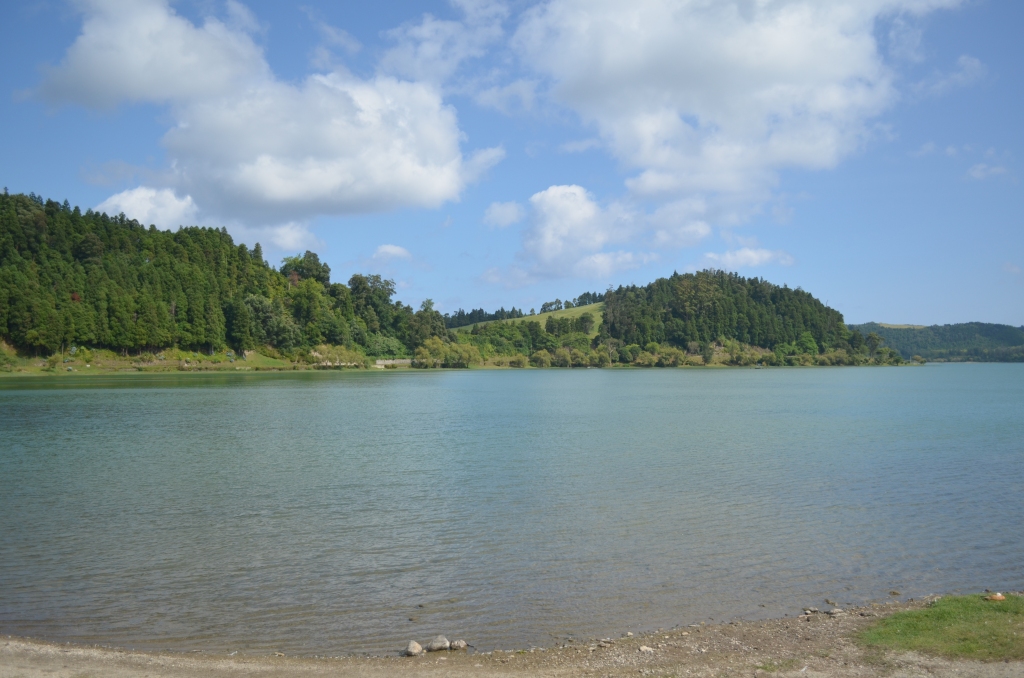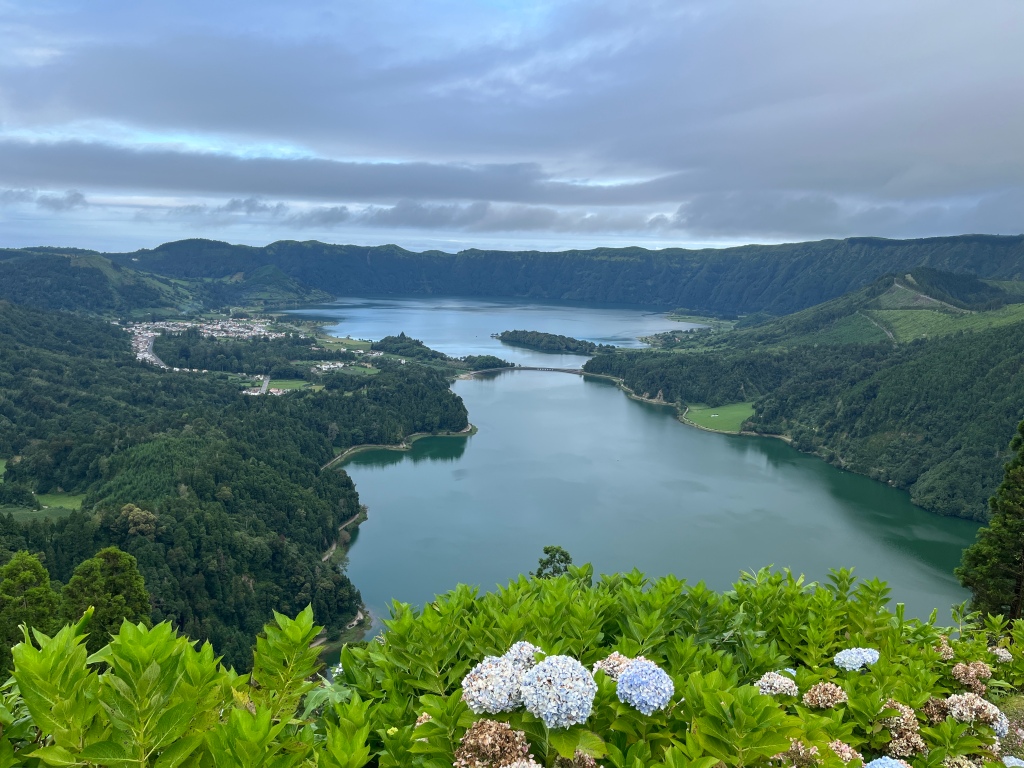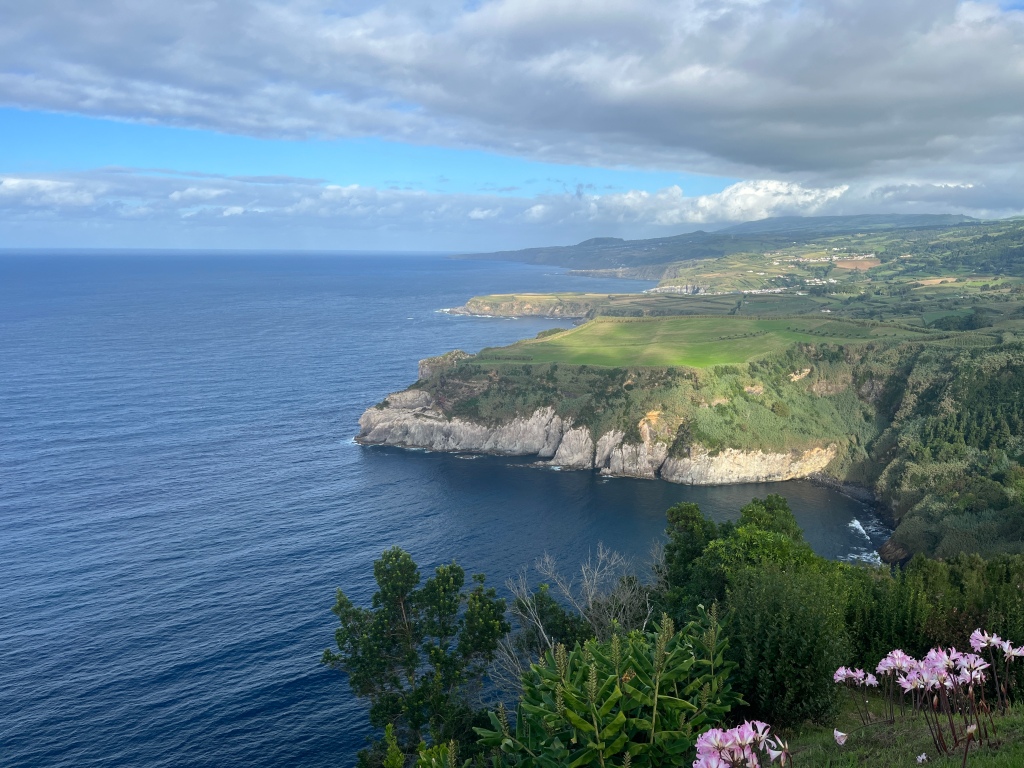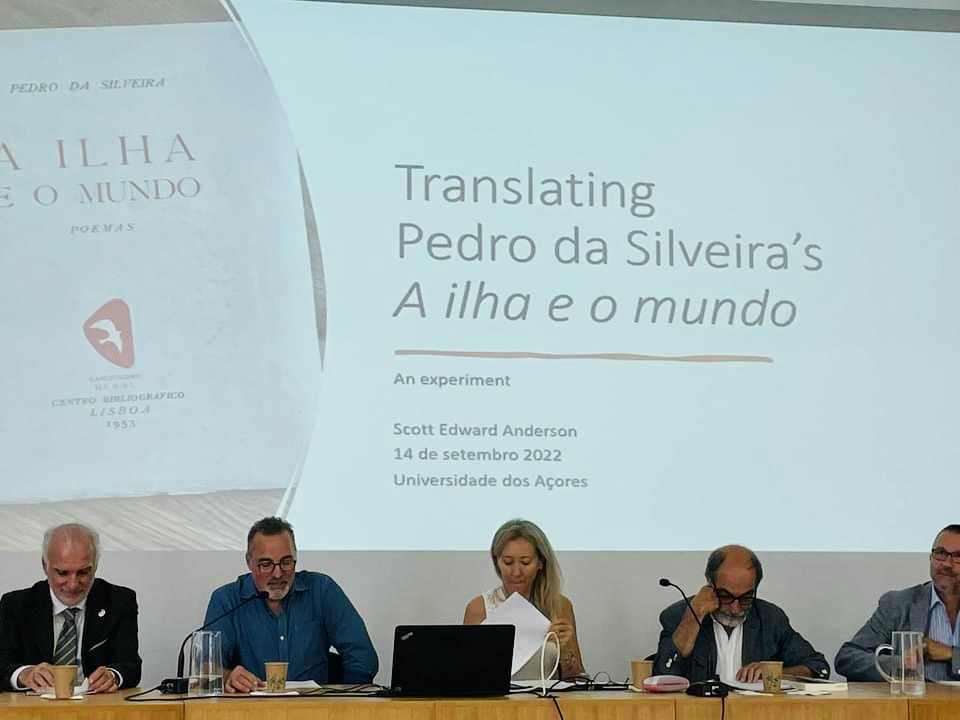National Poetry Month 2019, Week Three: Sophia de Mello Breyner Andresen’s “Descobrimento”
April 22, 2024

This Thursday marks the 50th anniversary of the Carnation Revolution, whereby the people of Portugal overthrew the dictatorship under which they had lived for forty-eight years. I have previously shared my translation of Sophia de Mello Breyner Andresen’s poem of the revolution, “25 de Abril” (“25th of April”). Sophia was born in Porto in 1919, she died in 2004 at the age of 84 and is now buried in the National Pantheon in Lisbon, an honor recognizing her as one of Portugal’s greatest poets.
Her work often explored themes of nature, particularly the power and mystery of the sea. Indeed, she can be considered a poet of the sea. One poem that encapsulates her maritime inspiration is “Descobrimento” (“Discovery”). In “Discovery,” Andresen paints a vivid, almost surreal portrait of the ocean through metaphor and visceral imagery. She writes of “An ocean of green muscles/ An idol with as many arms as an octopus/ Incorruptible chaos that erupts/ And orderly turmoil…” [my translation]. This strange yet mesmerizing depiction captures the paradoxical nature of the sea — its turbulent, ungovernable force coexisting with an inherent rhythm and pattern.
The sea represented many things for Andresen beyond its literal presence. As a dedicated Hellenist, she found inspiration in ancient Greek mythology and often blurred the lines between the Atlantic Ocean of her Portuguese homeland and the Mediterranean. The sea became a symbol of renewal, eternity, and the mysteries of life and death.
Her reverence for the ocean likely stemmed from her childhood spent along the coast in Porto, watching the ebb and flow of the tides. The poem evokes her early, formative experiences at Praia de Granja, a beach south of Porto that shaped her poetic vision.
In “Discovery,” Andresen seems to be urging the reader to explore the depths of the ocean and surrender to its “incorruptible chaos.” The sea is both menacing with its crashing waves and comforting in its ceaseless cadence. By wading into those waters, perhaps we can access greater truths about ourselves and the world around us.
With her luminous language and profound naturalism, Sophia de Mello Breyner Andresen invites the reader to discover the ocean anew through her transcendent poetry. “Discovery” reminds us that the seas contain not just thrilling adventures and discoveries, but insights into the very essence of our existence.
Here is my translation of Sophia de Mello Breyner Andresen’s “Descobrimento”:
Discovery
An ocean of green muscles
An idol with as many arms as an octopus
Incorruptible chaos that erupts
And orderly turmoil
Dancer twisted up
Around the outstretched ships
We cross rows of horses
Who shake their manes at the trade winds
The sea suddenly became too young and too old
To show the beaches
And a people
Of newly created men still clay-colored
Still naked, still dazzled
—
Here is the poem in its original Portuguese:
Descobrimento
Um oceano de músculos verdes
Um ídolo de muitos braços como um polvo
Caos incorruptível que irrompe
E tumulto ordenado
Bailarino contorcido
Em redor dos navios esticados
Atravessamos fileiras de cavalos
Que sacudiam as crinas nos alísios
O mar tornou-se de repente muito novo e muito antigo
Para mostrar as praias
E um povo
De homens recém-criados ainda cor de barro
Ainda nus ainda deslumbrados
–Sophia de Mello Breyner Andresen
From Obra Poética III, published by Caminho, Lisboa
To hear Sophia read her poems in 1985: https://www.loc.gov/item/93842563/
My translations of Sophia de Mello Breyner Andresen, along with several other Portuguese poets, appear in my book Wine-Dark Sea: New & Selected Poems & Translations (Shanti Arts, 2022), available through this link or wherever you buy books.
In December 1994, I attended a poetry reading at Poets House in New York by two Portuguese poets, Nuno Júdice and Pedro Tamen, along with the translator, Richard Zenith. Little did I know that this event would have an impact on the profound journey into my ancestral roots in Portugal and the Azores.
After my Portuguese grandfather passed away in September 1993, I was at a loss to uncover our family’s history, which he had been reluctant to share. Hearing Júdice and Tamen read their poems in Portuguese the following December was a revelation of sorts—here were real, live Portuguese poets speaking the language of my ancestors.
The dearth of first-hand accounts and available source materials kept me from learning my family’s Portuguese Azorean history for many years and, frankly, life got in the way of digging deeper. When my father died in 2016, I realized that all my family’s histories were available to me, except one part—the Portuguese. By then, Ancestry.com had made many research materials available online for the first time, and a group of Azorean Genealogists gathered on a listserv to share information, leads, and help translate documents from the Azores, much of which had also become available online in the form of scanned records from the parish archives from the Azores. Suddenly, my research got easier.
In 2018, I made my first trip to the Azores and Portugal, and before going, I reached out to Nuno Júdice, whose contact information I had kept from that poetry reading decades ago.
To my surprise, Nuno remembered me, and we arranged to meet during my visit to Lisbon in July of that year. We spent a delightful evening together, with Nuno sharing insights into Portuguese poetry, history, and culture. Our connection deepened further when he invited me to write a foreword for David Swartz’s English translation of his novella, The Religious Mantle, and later, he published several of my poems in a literary journal he edited.
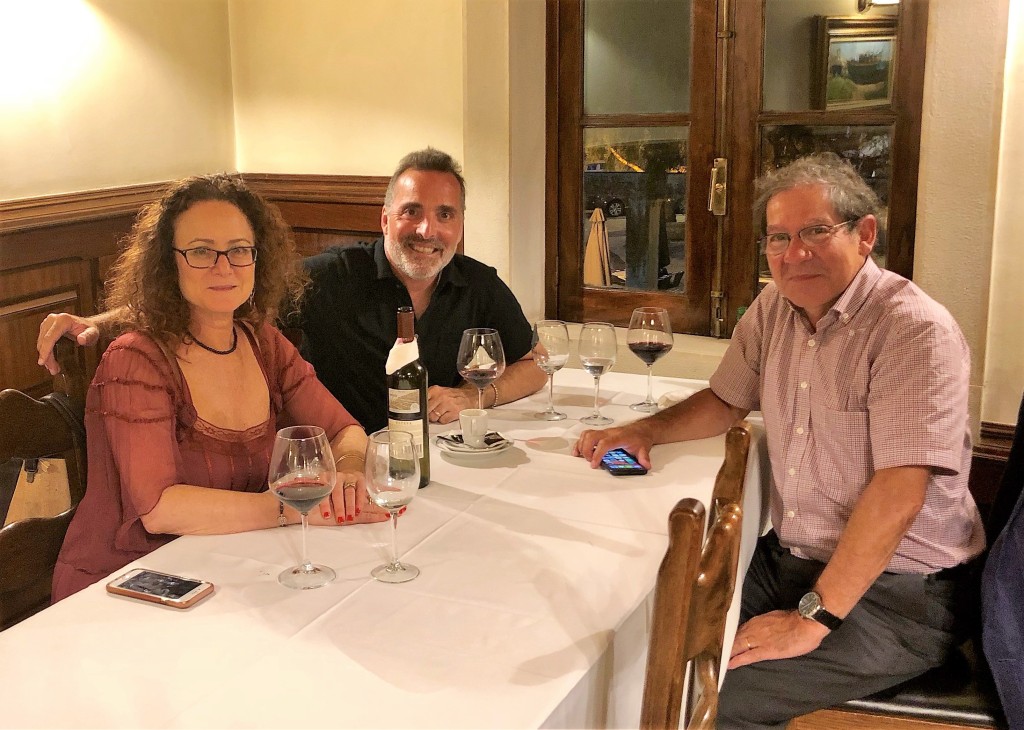
In 2020, Nuno graciously provided a blurb for my book Azorean Suite/Suite Açoriana, celebrating the work as a poetic exploration of ancestral memory and the experiences of Portuguese emigrants.
Our paths continued to intertwine as the translator Margarida Vale de Gato, whom Nuno had earlier recommended for my poems, agreed to translate my book Dwelling: an ecopoem into Portuguese. Nuno even agreed to help launch the translated edition, Habitar: um ecopoema, in Lisbon in September 2022. In many ways, this felt like coming full circle from our initial encounter at that poetry reading nearly three decades ago.
In a serendipitous twist, Júdice revealed that he had met one of my teachers, the renowned poet Gary Snyder, whom Margarida had also translated, in Madrid in the 1980s. He even shared a draft of a poem he had written about that encounter, further solidifying the interconnectedness of our poetic journeys. When Nuno Júdice passed away last month unexpectedly, I was deeply sad to hear the news from David Swartz; I had just been thinking about Nuno and had planned to write to him. He would have turned 75 years old later this month.
Here is Nuno Júdice’s poem, “Madrid, Anos 80” and my translation from the Portuguese:
MADRID, ANOS 80
Cruzei-me uma vez com Gary Snyder nas Bellas Artes
de Madrid. Eu vinha com livros espanhóis – poesia, e algum
Borges, onde há sempre coisas novas – e cruzei-me com Gary
Snyder, que vinha de ler poemas, mas quando o soube já
a leitura tinha acabado. Também não sei se o iria ouvir: não é
todos os dias que se está em Madrid, com tempo para ir
às livrarias e espreitar museus; e ouvir Gary Snyder pode
não dar jeito ou, pelo menos, obrigar a que se perca alguma coisa
que tão cedo não se voltará a ver. Foi assim que, antes de ir à livraria,
eu tinha passado pelo Caspar David Friedrich, no Prado,
perseguindo montanhas e ruínas da velha Alemanha. Ao sair dali,
com os olhos enevoados pelo mar do Norte, como iria
entrar numa sala para ouvir Gary Snyder? Da próxima vez
que estiver em Madrid, porém, não vai ser assim: e se me cruzar,
nas Bellas Artes, com um poeta que acabe de ler poemas,
mesmo que eu venha da livraria, e tenha passado pelo Prado,
vou arranjar tempo para o ouvir – em homenagem a
Gary Snyder, que não tive tempo
para ouvir.
Nuno Júdice, 26-11-2000
__
MADRID, 80’s
I crossed paths with Gary Snyder once, at Bellas Artes
in Madrid. I was carrying Spanish books – poetry, and some
Borges, where there are always new things – and I bumped into Gary
Snyder, who came to read poems, but by the time I found out
the reading was over. I didn’t know if I would listen to him either: it isn’t
every day that you’re in Madrid, with time to go
to bookstores and look around museums; and listening to Gary Snyder might
not be useful or, at least, make you miss something
that you won’t see again anytime soon. So, before going to the bookstore,
I had passed by Caspar David Friedrich, in the Prado,
chasing mountains and ruins of old Germany. As I left,
with eyes clouded by the North Sea, how was I going to
walk into a room to listen to Gary Snyder? The next time
when I’m in Madrid, however, it won’t be like that: and if you bump into me,
in Bellas Artes, with a poet who has just finished reading poems,
even if I’m coming from the bookstore, and have just passed through the Prado,
I will make time to listen – in honor of
Gary Snyder, who I didn’t have time
to hear.
Translated from the Portuguese by Scott Edward Anderson
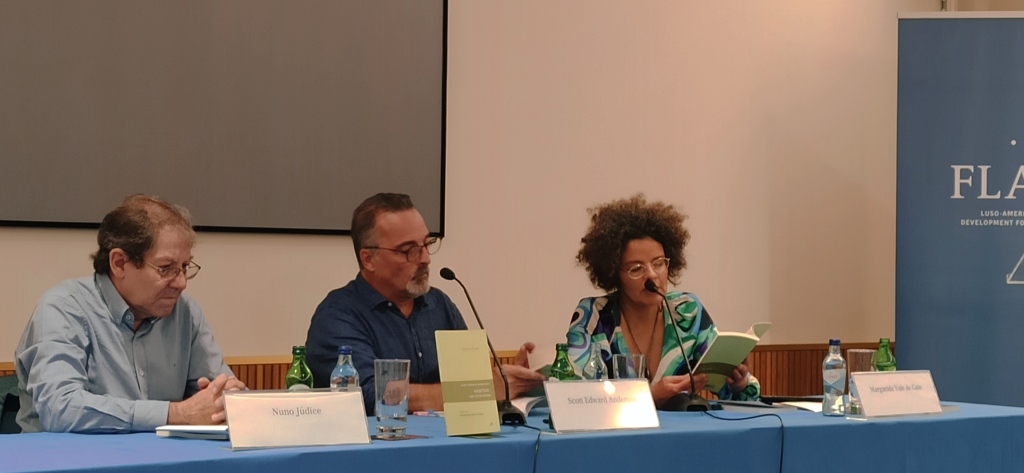
My Year in Writing 2023
December 6, 2023
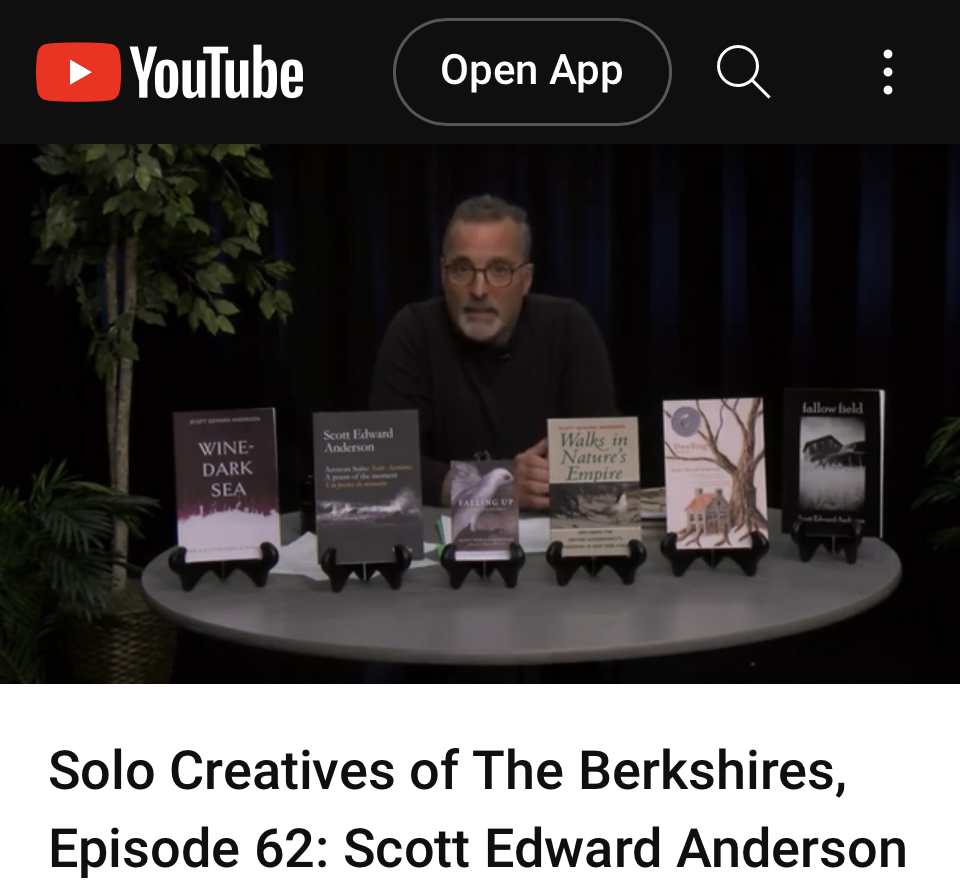
Now is the time, between my birthday and the end of the year, when I take stock of my year in writing. This year, which culminated my sixtieth trip around the Sun, has been a pretty productive year.
Here are some of the highlights:
Barzakh Magazine accepts essay, “Açorianidade & the Radiance of Sensibility” just after Xmas! (Published in January)
Reading of Berkshire Writers in Housatonic; read the first chapter of Falling Up. (January)
Guest writer @ Margarida Vale de Gato’s Eco-poetics Masters Class, Universidade de Lisboa via Zoom (January)
Alfred Lewis Bilingual Reading Series, FresnoState PBBI(part of the PBBI-FLAD lecture series 2023), Co-curators: Diniz Borges and RoseAngelina Baptista; Poets: Alberto Pereira, Sam Pereira, PaulA Neves, Scott Edward Anderson, and RoseAngelina Baptista (February)
Guest lecturer, Universidade de Lisboa, Professora Margarida Vale de Gatos’ class on American Literature in person. (March)
Guest speaker, Universidade dos Açores, Ponta Delgada, Professora Ana Cristina Gil’s class, in person. (March)
My essay, “STUDIO LOG: THE TOM TOM CLUB’S “GENIUS OF LOVE,” A MEMOIR AND EXPOSITION IN 18 TRACKS,” lost in the 2nd Round of the Marchxness battle of “One Hit Wonders” to Adam O. Davis’ essay on “In a Big Country” by Big Country. (March)
Installation of my poem. “River of Stars,” on Poetry Path at Ryan Observatory at Muddy Run, and presentation with Michele Beyer (a teacher inspired by my conversation with Derek Pitts in November 2022) to write poetry with her class. (April)
Interview by Francisco Cota Fagundes published in Gávea-Brown: A Bilingual Journal of Portuguese-American Letters and Studies, XLVII, as part of a special issue devoted to Celebrating Portuguese Diaspora Literature in North America. (Spring)
Guest lecturer, University of California at Santa Barbara, Portuguese literature class, Professor André Corrêa de Sá. (June)
“Love & Patience on Mt. Pico” (essay) published in The Write Launch (July)
“Through the Gates of My Ancestral Island” (essay) published in Panorama: The Journal of Travel, Place, and Nature (July)
“Orpheu Ascending,” a review of Orpheu Literary Quarterly, volumes 1 and 2, translated from the Portuguese by David Swartz, published in Pessoa Plural—A Journal of Fernando Pessoa Studies, Issue 23 (July)
Seeing—Reading—Writing: Transforming Our Relationship to Language and Nature: A Workshop with Ryan Shea and Scott Edward Anderson at The Nature Institute, Ghent, NY (July)
Creative nonfiction mentor, Adroit Journal Summer Mentorship Program, mentored two students. (July)
“Birds in the Hand: The Berkshire Bird Observatory’s Impassioned Ben Nickley” (article) in Berkshire Magazine. (July)
Poetry booth, “Zucchrostic poems,” at West Stockbridge, MA, Zucchini Festival (August)
Two poems in Into the Azorean Sea: A Bilingual Anthology of Azorean Poetry, translated and organized by Diniz Borges, published by Letras Lavadas in São Miguel and Bruma Publications, Fresno State. (August)
Meet & Greet at The Book Loft in Great Barrington, MA. (Sept)
“Berkshire Brain Gain” (article) published in Berkshire Magazine (Sept)
Dedication of Binocular telescope at Ryan Observatory at Muddy Run and poems by Ada Limón and Gabe Catherman installed on Poetry Path. (October)
Visited Praia da Vitória on Terceira Island, Azores, birthplace and boyhood home of Vitorino Nemésio. (October)
Participated in Arquipélago de Escritores in Angra on Terceira Island. (October)
Met António Manuel Melo Sousa in Ponta Delgada with Pedro Almeida Maia (see related entry below) (October)
Guest lecturer, Fresno State, Professor Diniz Borges’ class on Azorean Literature, presented “Becoming Azorean American: A Diasporic Journey,” (lecture). (October)
“António Melo Sousa, Letras de canções e outros rascunhos – uma apreciação” (review) published in Grotta: Arquipélago de Escritores, #6. (November)
Recorded an episode of “Solo Creatives of the Berkshires” for CTSB-TV, Community Television for the Southern Berkshires, presenting and reading from several of my books. (November)
“Get ‘Hygge’ With It: Cozy Spots and Comfort Food in the Berkshires” (article) published in Berkshire Magazine. (December)
“Seeking My Roots Through a Painter’s Eyes” (essay) published in Revista Islenha, Issue 73, in Madeira, Portugal. (December)
Habitar: um ecopoema, Margarida Vale de Gato’s translation of my book, Dwelling: an ecopoem, gets mention in Paula Perfeito’s Entre-Vistas blog. (27 December)
What a year! I am exceedingly grateful to everyone who has supported my writing over the past year. As Walter Lowenfels wrote, “One reader is a miracle; two, a mass movement.”
Like I said last year, I feel like I’ve been blessed by a mass miracle this year!
Discover the Power of Deep Attention: Seven Reasons to Join the Azores Writing Retreat with Scott Edward Anderson
July 7, 2023
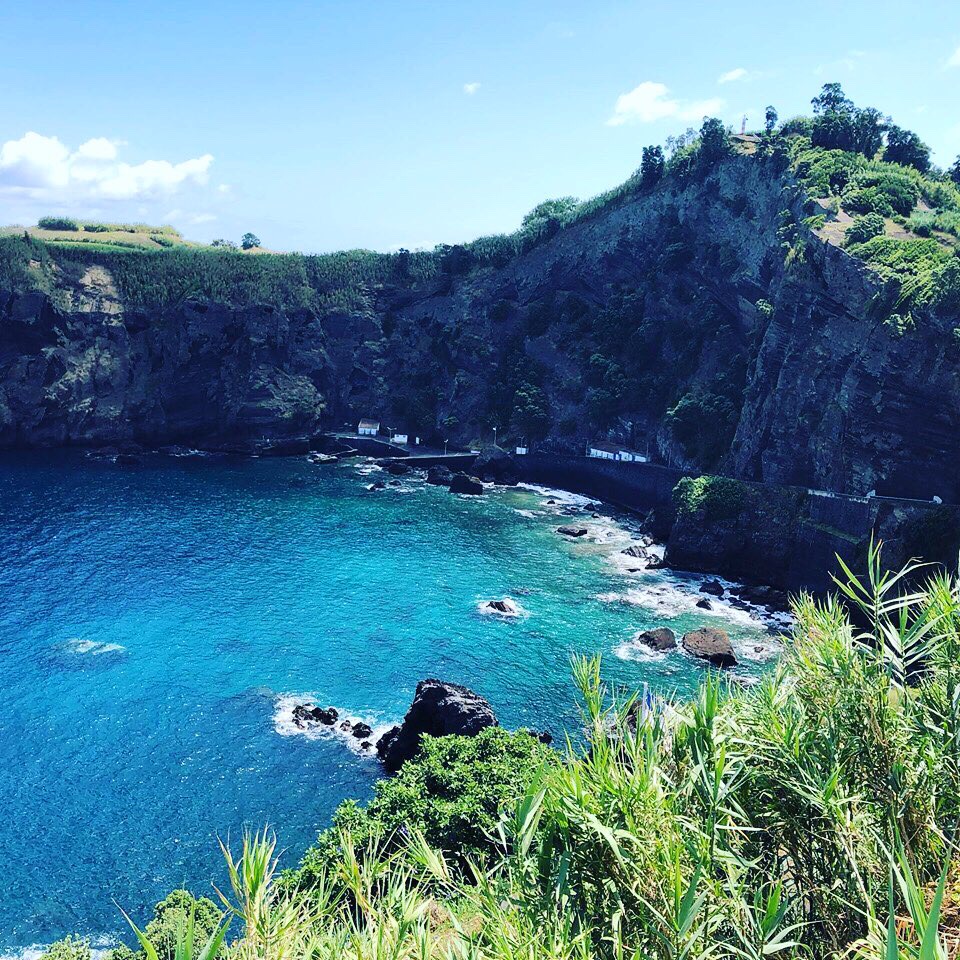
Are you a writer seeking to delve into the depths of your creative well? Are you a would-be writer who has always wanted to write, but could never find the time or discipline? Do you long to cultivate a focused, immersive writing practice that transcends distractions and unlocks your true potential?
If so, we invite you to embark on a life-changing journey to the breathtaking Azores archipelago for a Deep Attention Writing Retreat with the esteemed author Scott Edward Anderson. From 13-18 October 2023, get ready to immerse yourself in an oasis of inspiration, surrounded by stunning natural beauty and the nurturing guidance of an expert wordsmith.
Here are seven reasons why attending this retreat could be the turning point in your writing journey:
1. Unleash Your Creative Potential: Scott Edward Anderson, an award-winning poet, memoirist, and essayist, is renowned for his ability to coax out the hidden depths of creativity within writers and would-be writers alike. Through his extensive experience and compassionate mentorship, he will help you tap into your unique voice and express your ideas with profound clarity and emotional resonance.
2. Deep Attention Practice: In an age of constant distractions, cultivating deep attention has become a superpower. This retreat is designed to help you reclaim your focus and immerse yourself in the present moment, where creativity flourishes. Through mindfulness exercises and specially curated nature-based interactive sessions, you will learn how to quiet the noise of the world and give undivided attention to your craft.
3. Inspiring Natural Surroundings: Nestled in the stunning Azores archipelago, this retreat on São Miguel Island offers an idyllic setting for creative exploration. Picture yourself surrounded by lush green landscapes, breathtaking ocean views, and the soothing sounds of nature. The serene ambiance of the Azores will inspire and invigorate your writing, providing the perfect backdrop for introspection and inspiration.
4. Intimate and Supportive Community: Connecting with fellow travelers who share your passion can be a transformative experience. The retreat fosters a warm and nurturing community, allowing you to engage in meaningful discussions, exchange ideas, and form lasting connections. The power of collective creativity and support will propel you forward on your writing journey long after the retreat ends.
5. Expert Guidance and Mentorship: Scott Edward Anderson’s wealth of knowledge and expertise will guide you through the intricacies of his Deep Attention writing practice. He will share invaluable insights into the craft and practice of writing and evoking deep emotions through language. His mentorship will help you grow as a writer and expand your creative boundaries, as it has for others like M. Chun, who says that Anderson “continuously expressed an encouraging and supportive approach toward my creative work, and I easily felt comfortable and confident sharing my ideas with him…[he] kindled my brainstorming process by recommending similar pieces and writers, and he also helped me pinpoint themes…from my initially unstructured ideas.”.
6. Reflection and Self-Discovery: Writing is not just about words on a page; it is a profound act of self-discovery. During the retreat, you will have ample time for introspection, allowing you to explore your inner landscape, uncover new perspectives, and deepen your understanding of yourself and your craft. This transformative journey will leave you with a newfound sense of purpose and direction in your writing.
7. Cultural Immersion: The Azores, with its rich cultural heritage and vibrant traditions, offers a unique opportunity for cultural immersion. From exploring local cuisine to engaging with the island’s history and culture, you’ll gain fresh insights that can enrich your writing. The vibrant tapestry of Azorean life will infuse your work with a sense of place and authenticity.
Spaces for this exclusive retreat are limited, so seize the opportunity to embark on a transformative journey of creative exploration. Escape the distractions of daily life, immerse yourself in the Azores’ natural beauty, and let Scott Edward Anderson’s guidance and mentorship unlock the full potential of your writing. Join us on this profound adventure and discover the transformative power of Deep Attention. Register today: Azores Deep Attention Writing Retreat
My short answer to this question is “No, absolutely not.” In fact, I’ve specifically designed the Azores Writing Retreat to meet you where you are as a participant, whether you consider yourself a writer or not. We all have stories we need to tell. Whether we consider ourselves writers is beside the point.
“We tell ourselves stories in order to live,” Joan Didion began her famous essay “The White Album.” I would further argue that we tell stories because it is an essential act of being human. Indeed, some scientists believe we may be hard-wired to tell stories.
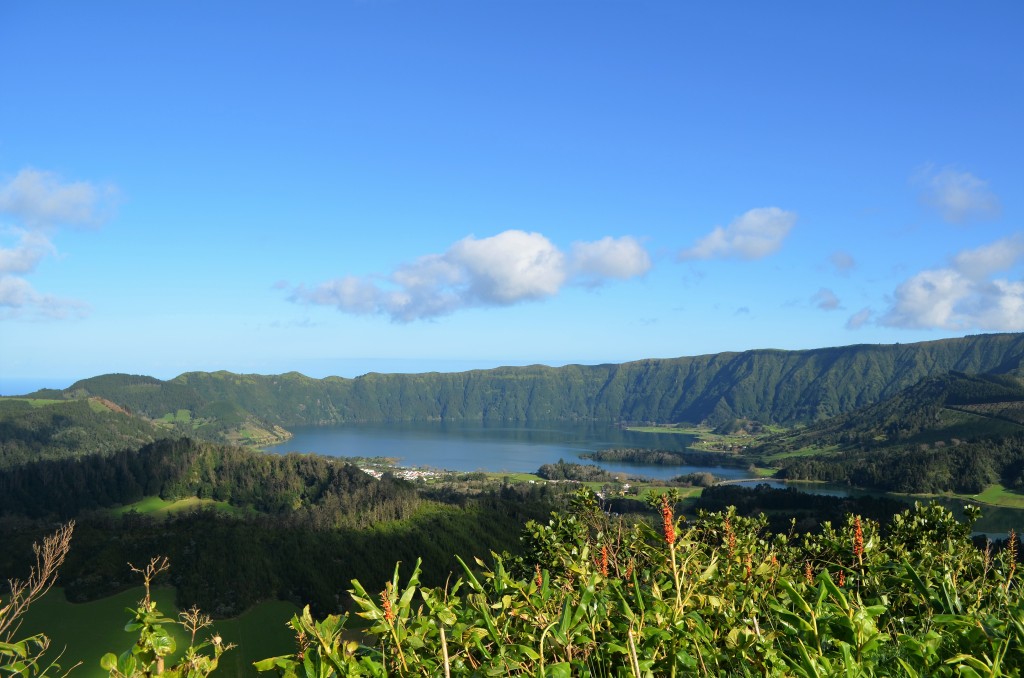
As I wrote in my essay, “Telling Stories to Change the World,” which appeared in Terrain.org in 2006, “a story is a narrative account of a real or imagined event or events. Stories build worlds and define worldviews. Sharing experience through stories, we pass on accumulated wisdom, beliefs, and values. Through stories we explain how and why things are, and we define our role and purpose.”
In that essay, I also quote the National Storytelling Network, which says that “Stories are the building blocks of knowledge, the foundation of memory and learning.” They “connect us with our humanness and link past, present, and future.”
From our earliest time as a species, when we were hunter-gatherers, we told stories about the best hunting places or where plentiful berries could be found. Later, we told each other stories about planting crops and which crops grew best in what climate, soil, or aspect of the sun. We evolved as a species through stories, and we are grounded in stories. Storytelling may be a tradition as old as human communication itself.
Stories connect people to other people and to place, to the land and sea. That’s what I’m trying to do with the Azores Writing Retreat. We’ll spend five days getting connected to the land and sea of my ancestral island, São Miguel. We’ll connect with the nature, culture, food, and people of the island. And we’ll connect with each other as a cohort, listening to the stories we have within us that are yearning to be told.
At the end of the Azores Writing Retreat, whether you consider yourself a writer or not, my hope is you will come away with a deeper appreciation of the stories you have to write and a sense that your stories are important, whether you write them for yourself, your friends and family, or for possible publication. I hope you’ll join me on this remarkable journey.
For more information and to Register for the retreat: Azores Writing Retreat
Why a Writing Retreat in the Azores?
May 25, 2023
People ask me why a Writing Retreat in the Azores? My first answer to that question is: because I want to share my ancestral island and its natural and cultural gifts with you. My second answer is: what better place to practice deep attention to our writing than on a remote island in the middle of the Atlantic?
Writing without distraction is particularly difficult these days, that’s why I’ve designed the Azores Writing Retreat around what I’m calling Deep Attention. Everything we do will be guided by this framework, designed to develop a practice we can take with us long after the retreat is over.
Deep Attention is a practice I’m developing in response to our age of distraction. Paying attention in an age of distraction is hard. At any given moment, there is a myriad of distractions tempting us away from our writing.
If we’re paying attention, however, we can put our busy lives in perspective, create a context for what we’re doing on this planet. Living like this, life is not about going through the motions; rather, we actively participate in life, in all its facets.
Deep Attention sets us up for opening the writing brain, for preparing that muscle to do its best work. Working the writing-brain in this way makes it easier to pay attention, not only to our surroundings, but to our words and what the piece of writing is trying to say. It’s also a reciprocal, regenerative act: paying deep attention informs our writing and our writing helps us pay deeper attention.
For me, the practice of Deep Attention is part of the act of writing, as the practice of writing is part of the act of paying attention, a cyclical, symbiotic relationship. This type of attentiveness is akin to what Zen practitioners call deep listening.
As Zen practice implies, deep listening requires complete receptivity—an openness and attentiveness to what’s possible and to asking questions. If we have a question to answer through our writing, we need to ask it. Nevertheless, it sometimes seems like our minds are on autopilot and we are not truly paying attention, causing us to miss both questions and answers.
This deep listening and attentiveness are a form of tuning to the right frequency. Like the dial on an old car radio, if you turn a little too much to the right or left, you lose the signal. Through the act of paying attention, we fine-tune our ability to land on the right frequency.
Deep Attention requires a two-fold approach to paying attention: outward and inward. Outward: what’s going on around you and what you see, what you notice. Inward: what’s going on within you and your reactions to what you notice. Combined, this inward and outward focus develops our ability to see things others do not see and allows us to call attention to those things in our writing. Inward-focused attention also helps us turn observation into a piece of writing, aligning the frequencies and images to unlock the stories within us.
Deep Attention is, in part, a form of showing up, of being fully present, fully engaged. Distractions govern so much of our lives—from social media to work life—we so rarely allow time for deep attentiveness. If we make it a practice, however, we can begin to form insights and become more receptive to the poetry of our everyday lives and bring it into our writing.
Join me on the island of São Miguel for this five-day Deep Attention Retreat, October 13-18, 2023, where we’ll learn the practice Deep Attention, immerse ourselves in the incredible nature of the “Hawaii of Europe,” savor the delectable cuisine of the Azores, and get a lot of writing done.
Reserve your spot today: Azores Writing Retreat.
If you’ve ever dreamed of exploring the art of writing on an enchanted island, this is your opportunity! Join me for this unique writing retreat in the Azores, Portugal — the “Hawaii of Europe.”
We’ll spend five days on magical São Miguel, one of the nine islands of the Azorean archipelago, “an otherworldly paradise for nature lovers and outdoor adventurers,” as described by Travel & Leisure. We’ll Immerse ourselves in the luxury of one of the island’s most elegant hotels, situated on an 18th century orchard estate, famous among islanders for blending tradition and nature. We’ll savor the cuisine of the island, which fuses farm-to-table and ocean-caught freshness with gourmet takes on traditional Portuguese recipes. And we’ll explore some of the natural wonders of the island, including the hot springs of Furnas, the beauty of the twin volcano lakes at Sete Cidades, and forest bathing in Pinhal da Paz (the pine grove of peace).
During this retreat, you’ll have ample time to write. After a delicious Azorean breakfast, I’ll lead a guided, intention-setting session before you set out to write on your own in the seclusion of the gardens or wherever you choose on the hotel grounds.
I’ll share my mindful approach to writing, what I call “Deep Attention,” a creative practice of looking at the world with intention and without distraction, which I first outlined in this essay. The retreat will incorporate this deep attention practice to help you tap into your creativity, gain new perspectives, and get beyond your daily, habitual obsessions and distractions.
Lunch will be served at the hotel or on guided field trips. After the afternoon field trip, you’ll have an opportunity for another writing session or free time to relax, use the spa, pool, or soak in the heated plunge pool in the pineapple greenhouse. After dinner, you’ll have an opportunity to share your work or reflect upon your experiences.
I’ve designed this retreat to show you some of the best my ancestral island has to offer, and I’ve hand-picked the hotel, restaurants, excursions, and experiences to ensure you will be inspired to write in a relaxed, mindful, and encouraging environment.
Early Bird Discount ends on June 15th, so sign up today!
Find out more: https://www.scottedwardanderson.com/azores-retreat
Last summer, I started a project to translate the Azorean poet Pedro da Silveira’s first book A ilha e o mundo (The Island and the World), which came out in 1952.
I had reviewed the late George Monteiro’s translation of Silveira’s last book, published in a bilingual edition by Tagus Press in the States and simultaneously by Letras Lavadas in the Azores in 2019 as Poems in Absentia & Poems from The Island and the World. In fact, the second half of that title was a misnomer; the book included only a few poems from Silveira’s first book–poems that had previously appeared in a Gávea-Brown anthology from the 1980s and sort of slapped on to the end of the book. (Silveira was born on Flores Island in 1922 and died in Lisbon in 2003.)
What struck me immediately about Silveira’s poetry—in Monteiro’s translation first and then in reading the facing Portuguese—was the depth of its feeling, the simplicity and directness of its language, and the brilliant tapestry woven by strands of memory, naming, and observations of nature. Indeed, all aspects that are found in my own poetry; hence, I felt a certain kinship with Silveira’s work straight away.
And yet, I was equally struck by the dearth of his poetry available in translation. How could such a seemingly important poet be so little represented in English translation? How much richer would the world of poetry–and the world of poetry-in-translation–be with Silveira’s body of work. And how much richer would be our lives in the Azorean diaspora with his sentiments, steadfast observations, and steady poetic hand.
I started with the second poem in the book, “Ilha”; this was likely the first poem I ever read by Silveira in translation, from that old Gávea-Brown anthology previously mentioned.
Here is the entire poem in its original Portuguese:
ILHA Só isto: O céu fechado, uma ganhoa pairando. Mar. E um barco na distância: olhos de fome a adivinhar-lhe, à proa, Califórnias perdidas de abundância.
As I tend to do in my method of translation, I first read the poem straight through and then wrote an impression or literal reading as I understood it:
Just this:
The closed sky, a heron
Hovering. Sea. A boat in the distance:
Hungry eyes guessing, at the prow,
Californias lost of abundance.
A bit clunky and prosaic, and probably unworthy. I prefer to not read another’s translation (if there is one) while translating a poem lest I be influenced by it, so Monteiro’s sat on the shelf.
One thing troubled me, however. The bird. Where did that heron come from? Surely, I remembered it from Monteiro’s version. “Ganhoa,” at first, I thought was a misprint of “ganhou” – who won? – but that made absolutely no sense, so I went with heron. But what was a heron doing in this scene? Were herons even found in the Azores?
Reluctantly, I checked Monteiro’s translation. Sure enough, there it was, “heron.” It struck a dissonant chord with me now. A heron. Really? Again, I wondered whether herons were found in the Azores and turned to the Internet.
Yes, there were at least ten species of heron that have been noted on these islands, including great blues and little egrets, which according to the website whalewatchingazores.com have been sighted, but “not regularly”; the species is classified as an “uncommon vagrant” on the islands. And, most recently, a confirmed sighting of another species, the yellow-crowned night heron (Nyctanassa violacea) was described in a scientific paper by João Pedro Barreiros. Most likely, however, this one was blown east by a strong, errant wind from the west. Several herons were known to stop-over on their migratory path from Africa to northern climes and back.
Still, heron didn’t seem correct, to me, given the scene described. The use of Mar all alone. And the boat seemed to imply open waters rather than shoreline.
Herons are marsh-dwelling, shoreline species for the most part, so I was perplexed why they might be hovering “at Sea” or the “open ocean,” as I envisioned it. Were they blown off-course and out of their range? That would surely change the nature of this poem, which I assumed was about emigration or the emigrant returned or the desire to emigrate but also remain tied to the island. If it was not a heron, what was it then? What else might “hover” over the open ocean?
I typed “ganhoa” into Google. The almighty, all-seeing Google asked if I meant “ganhos” earnings; no, I did not. This was not a poem set in the halls of finance or a casino in Monaco. So, I clicked on “search instead for ganhoa” and up came a page from Priberam dicionário. I had my bird! The yellow-legged gull (Larus michahellis atlantis)…surely this bird would hover over the prow or bow of the boat, and even the stern, looking for a handout. A ganhoa recupera os seus ganhos. (The gull recovers its winnings.)
Here is my version of Pedro da Silveira’s “Island”:
Just this:
The closed sky, a yellow-legged gull
hovering. Open ocean. And a boat in the distance:
Hungry eyes, at the bow, divining,
lost Californias of plenty.
(Translated from the Portuguese by Scott Edward Anderson)
____
(This text was adapted from a paper delivered at the Colóquio celebrating the 100th anniversary of the birth of Pedro da Silveira, “Pedro da Silveira – faces de um poliedro cultural,” at the University of the Azores in Ponta Delgada, São Miguel, in September 2022.)
Speaking of the Azores: I am excited to host a Writing Retreat there from 13-18 October 2023! Join me for 5 days of writing and immersion in the nature, food, and culture of the Azores. We’ll explore the island, focus with deep attention, expand our horizons, and tap into the stories within. Details and registration at https://www.scottedwardanderson.com/azores-retreat
My Year in Writing: 2022
November 28, 2022

Now is the time, between my birthday and the end of the year, when I take stock of my year in writing. It’s been a pretty productive year, considering it also included a move from Brooklyn to the Berkshires:
Published Wine-Dark Sea: New & Selected Poems & Translations (Shanti Arts)
Book launch for Wine-Dark Sea online with Kathryn Miles (Feb)
Appearance on Portuguese American Radio Hour with Diniz Borges (March)
World Poetry Day/Cagarro Colloquium reading (March)
Book launch with Portuguese Beyond Borders Institute (March)
Book signing at Terrain.org booth at #AWP22 in Philadelphia (March)
Wine-Dark Sea gets “Taylored” by @taylorswift_as_books on Instagram! (March)
Lecture at University of the Azores: Mesa-redonda Poesia, Tradução e Memória (April)
Azores launch for Wine-dark Sea and Azorean Suite/Suite Açoriana at Letras Levadas in Ponta Delgada, São Miguel, Azores, with Leonor Sampaio Silva (April)
Açores Hoje television interview with Juliana Lopes on RTP Açores (April)
Terrain.org Reading Series with Joe Wilkins and Betsy Aoki (April)
“Phase Change” and “Under the Linden’s Spell” reprinted in TS Poetry’s Every Day Poems (online/email)
“Midnight Sun” and “Shapeshifting” reprinted in Earth Song: a nature poems experience (anthology), edited by Sara Barkat and published by TS Poetry Press
Named Ryan Observatory’s first Poet Laureate
Mentored 2 students in Creative Nonfiction for Adroit Journal Summer Mentorship Program (June/July) [UPDATE: one of the students I mentored got accepted into the University of Pennsylvania, early decision! So proud of her!]
Translated Pedro da Silveira’s A ilha e o mundo, his first book of poems (1952)
Excerpts from Corsair of the Islands, my translation of Vitorino Nemésio’s Corsário das Ilhas, published in Barzakh Magazine (online) (August)
Panelist/presenter at Colóquio: Pedro da Silveira – faces de um poliedo cultural, University of the Açores: On Translating Pedro da Silveira’s A Ilha (September)
Lançamento da obra Habitar: um ecopoema, Margarida Vale de Gato’s translation of Dwelling: an ecopoem, published by Poética Edições, with Nuno Júdice, Luís Filipe Sarmento, and Margarida Vale de Gato, at FLAD in Lisbon (September)
Guest lecturer in Creative Writing at University of the Azores (Leonor Sampaio Silva, professora)
Panelist/presenter at 36th Colóquio da Lusofonia, Centro Natália Correia, Fajã de Biaxo, São Miguel, Azores: reading from Azorean Suite/Suite Açoriana with Eduardo Bettencourt Pinto (October)
#YeahYouWrite Catskill Reading at Fahrenheit 451 House, Catskill, NY w/Stephanie Barber, Laurie Stone, and Sara Lippmann (October)
Guest Writer at UConn Stamford creative writing class (Mary Newell, professor) (October)
Poet & Astronomer in Conversation (with Derrick Pitts, Chief Astronomer of the Franklin Institute) at Ryan Observatory at Muddy Run, PA (November)

“Wine-Dark Sea” (poem) published in American Studies Over_Seas (November)
20th Anniversary of residency at Millay Arts and writing of Dwelling: an ecopoem (November) [UPDATE: Got asked to join the Board of Millay Arts in December.]
Selections from Habitar: um ecopoema published in Gávea-Brown (US) and Grotta (Azores)
Book reviews in Gávea-Brown and Pessoa Plural [Postponed until 2023.](December)
My essay, “Açorianidade and the Radiance of Sensibility,” accepted by Barzakh Magazine for publication in Winter 2023 issue. (December)
What a year! I am exceedingly grateful to everyone who has supported my writing over the past year. As Walter Lowenfels wrote, “One reader is a miracle; two, a mass movement.”
Like I said last year, I feel like I’ve been blessed by a mass miracle this year!

